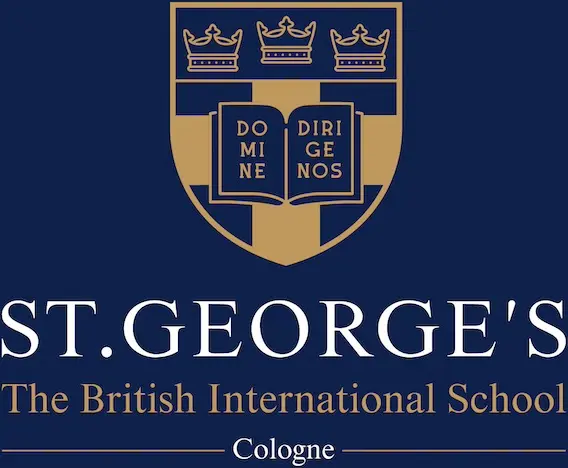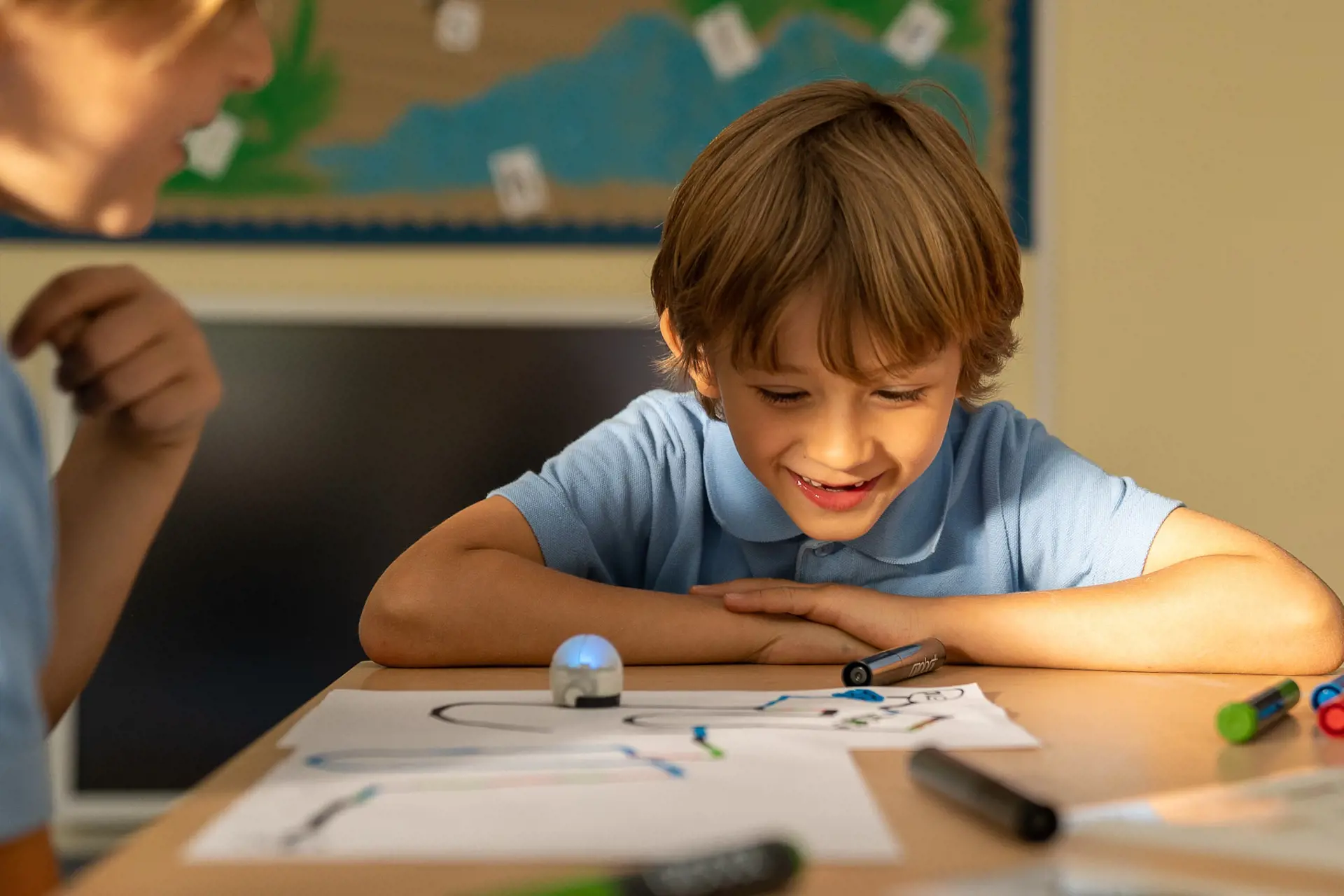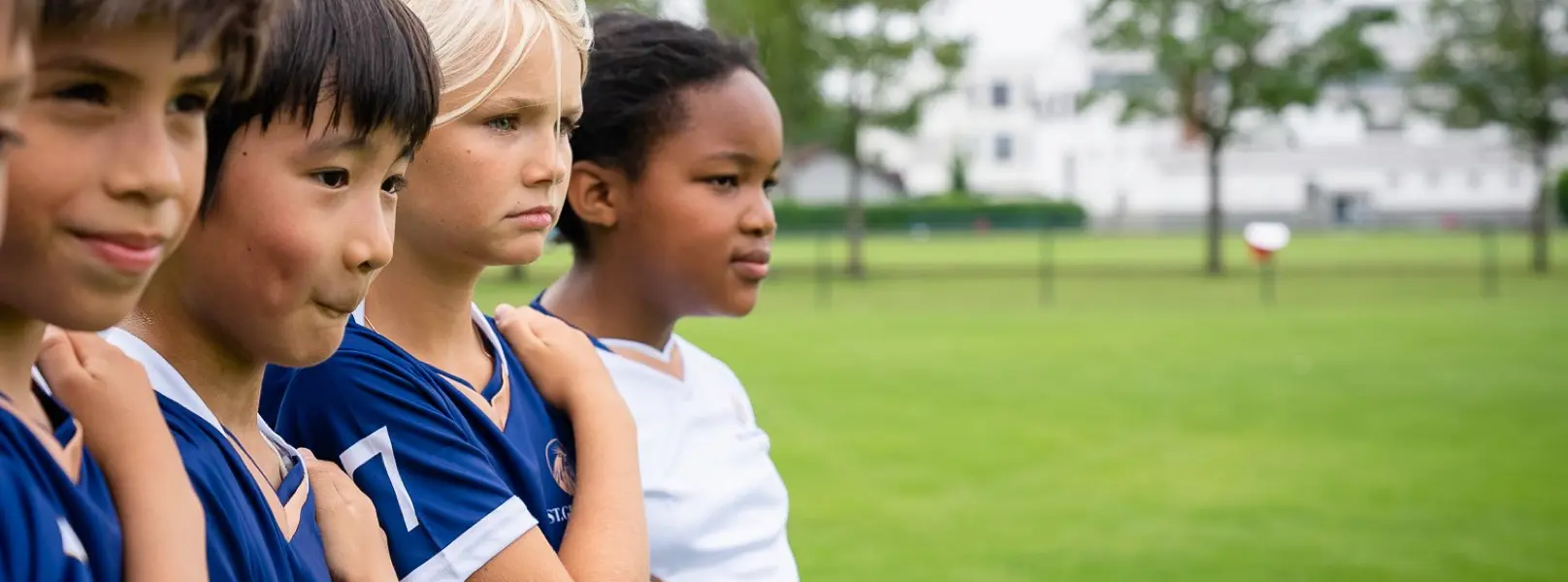We are here to help.
We invite you to browse a selection of our most frequently asked questions.
- Curricular
- Extra-Curricular
- Teacher Qualifications
- Admissions
- Facilities
- Fees / Financial Assistance
- Health & Nutrition
- Management / Operations
Curricular
|
Which curriculum do you offer at St.George’s schools? |
|---|
|
St.George’s caters for children from age 2 to 18 years and our curriculum evolves with their changing needs and educational stages. From Pre-Nursery to Reception, we follow the Early Years Framework. From Years 1 to 9, (Lower Primary, Upper Primary and Lower Secondary) we follow the National Curriculum of England. In Years 10 and 11, our Upper School students complete International GCSEs, which are accredited by Cambridge International Examinations. In Year 12 and Year 13, the final two years of schooling before graduation, our Sixth Form students study towards the International Baccalaureate Programmes (Diploma and Career-related Programmes) which allow access to leading universities worldwide. |
|
Are St.George’s qualifications recognised in Germany? |
|
Absolutely. Our qualifications hold formal recognition in Germany, providing students with as many opportunities as those from German state schools. For instance, with the correct combination of subjects and grades, IGCSEs are on a par with the Mittlere Reife and the IB Diploma Programme is equivalent to the Abitur. An IB qualification is well recognised by German universities and our students go on to study in areas such as medicine, law, business and engineering. Our dedicated teachers are readily available to offer guidance to students and parents regarding the specific requirements set by German authorities. |
|
What do children learn in Pre-Nursery, Nursery and Reception? |
|
In Early Years, our primary aim is to create a nurturing and family-oriented preschool environment. Each day is thoughtfully structured to blend direct teaching time, adult-led activities, and free play. This balanced approach fosters children's holistic development, encompassing their emotional, physical, creative, and intellectual growth. Children learn English through immersion and, from Reception, begin to receive German lessons from expert teachers. Our curriculum for this age group aligns with the English Early Years Framework, ensuring comprehensive and well-rounded development. |
|
Do you offer learning support and development of special talents? |
|
St.George's is dedicated to providing an education that caters to each child’s unique strengths, needs and interests. This includes support for lower-attaining pupils and opportunities to stretch the more able. As each pupil is unique, we encourage you to contact our admissions team as early as possible to discuss your child’s individual needs. They will be happy to provide you with comprehensive guidance and answer any specific questions you may have. |
|
How is technology integrated in the curriculum? |
|
We effectively integrate technology into the curriculum while honoring traditional values and fostering innovative learning methods. This balanced approach creates a dynamic and engaging learning environment that prepares students for personal and professional success in the digital age while preserving the core values of education. |
Extra-curricular
|
What Extra-Curricular activities do you offer? |
|---|
|
We offer a diverse range of more than 50 extra-curricular activities tailored to children’s interests and passions. Activities include creative pursuits, sports, dance, music, board games, cooking, and more. Students are encouraged to explore new interests, develop leadership skills, and forge meaningful connections with their peers through collaborative projects, performances, and competitions. We provide regular oversight and evaluation of extracurricular activities to assess their effectiveness and alignment with our educational goals. We review the impact of each activity on student development, to make informed decisions about program enhancements or adjustments, and we regularly update our termly schedule to ensure the widest range of activities over the course of each school year. |
|
How are the extra-curricular activities supervised and managed? |
|
Our extracurricular activities are carefully supervised and managed to ensure the safety, well-being, and positive development of all participants. Each extracurricular activity is overseen by dedicated teaching staff or external experts who provide guidance, support, and mentorship to students involved in the activity. They undergo training and certification to enhance their skills in providing the activity, managing group dynamics, and promoting positive behaviour. We have established clear policies and procedures governing extracurricular activities to maintain a safe and inclusive environment for all participants. |
|
What is the house system? |
|
The house system is an age-old tradition in British education and over the years has spread around the world reaching many countries and educational systems. It is traditionally associated with boarding houses but over time has become a positive element that enhances education within day schools as well. At St.George’s, we have four Houses. Upon joining the school, children are assigned to one of these houses, each one having it’s own identity, colours and name. The House System provides opportunities for pupils to develop all aspects of their personal growth and holistic learning: personality, morality, creativity, knowledge and skills. The system promotes values of community, fair play, teamwork, citizenship, mutual responsibility, self- discipline, initiative, perseverance and resilience. Furthermore, participation in house activities contributes to excellence in academic, social, sporting and cultural fields. It is a dynamic and inclusive way of organising the school community, getting younger pupils to mix with older students, and fostering a strong sense of pride, identity, and belonging among students and staff alike. |
Teacher qualifications
|
Where do the teachers come from? |
|---|
|
Our teaching staff is a diverse and talented group, carefully recruited from around the world. While many of our teachers are British nationals, we also have highly experienced and qualified staff members from Europe, the US, and Australia. Regardless of their nationality, all our teachers share the core values of St.George’s and possess a deep commitment to fostering the progress and well-being of their students. Their dedication makes a significant and positive impact on the lives of our pupils. |
|
What academic qualifications do the teachers have? |
|
As a school group, we have established a robust recruiting process which has been praised by external accreditors (IBO & COBIS). This carefully defined process ensures that all teachers who join the school meet our highest expectations. Teachers at St.George’s The British International School hold qualifications that meet or exceed the standards set by the UK Department for Education and that are recognised by the local education authority as suitable to the role.
|
|
What non-academic qualifications do the teachers have? |
|
In addition to formal qualifications relevant to the role, our employees are expected to demonstrate a commitment to the school's values and ethos, possess excellent communication and interpersonal skills, and be knowledgeable about international curricula and educational practices. We value prior experience teaching in multicultural or international settings. We are committed to the safeguarding of children and operate safer recruitment practices. As part of this, our employees are asked to provide documentation as proof of their identity, qualifications and suitability to work with children. Successful candidates must present an erweitertes Führungszeugnis (enhanced German police check) or a recent criminal record check of equivalent depth from their most recent country of residence (e.g. enhanced DBS Certificate or ICPC (International Child Protection Certificate). |
Admissions
|
Do you take children with limited or no English language? |
|---|
|
Pupils in our Primary School join us with widely varying levels of English, including some who have never learned English before. All new starters are assessed and offered additional language support as required. For Secondary School admission, and especially for acceptance into the IGCSE and IB Diploma programmes, we require an increasingly higher level of English proficiency and specific subject skills. It is therefore necessary for applicants in these year groups to sit placement tests in core subjects to evaluate their readiness for our educational programmes. |
|
Does my child need to speak German? |
|
No, German language skills are not required to enter St.George’s, and many pupils join our school with no knowledge of German. We have a range of German courses in place to support learners of all backgrounds, from beginner to native speaker. For those studying German at native level, we follow the local German language curriculum. |
|
Do you admit pupils at any time during the school year? |
|
We understand that life doesn't always conform to traditional school admission cycles, and so we avoid specific admissions deadlines and aim to be flexible around families’ needs. You may submit an application to St.George's at any point during the year although we encourage you to plan and apply to us as early as possible, to ensure that places can be secured. We have a strict limit of no more than 20 children per class. In most cases, children may start attending St.George’s at any point during the school year, but there are some exceptions, notably for applicants to our Upper School and Sixth Form, who would more likely need to join at the beginning of a cycle. Whatever the starting point, we strive to provide a seamless integration into our educational environment and we are always eager to consider individual circumstances. |
|
Are children required to sit entry tests? |
|
At St.George’s School, we are dedicated to both inclusive education and upholding rigorous academic standards. Our admissions process is designed to ensure the best fit for each child’s educational journey. For Primary School admission, children are invited to take part in a trial day, during which they may be asked to complete some assessed work to allow us to understand their unique strengths and needs. For Secondary School admission, and especially for acceptance into the IGCSE and IB Diploma programmes, we require a certain level of English proficiency and specific subject skills. We therefore invite applicants to take part in a trial day and sit some placement tests in core subjects, helping us evaluate their readiness for our educational programmes. Trial days and placement testing can be arranged throughout the year. |
Facilities
|
What are the conditions of the classrooms, and common areas? |
|---|
|
All our school facilities are purpose-built, designed to provide an innovative and enriching learning environment for our students. Our facility development reflects our commitment to excellence, sustainability, and student-centered design and learning principles. Our school facility serves as a hub of community engagement and collaboration. We welcome parents, community members, and local organisations to participate in school events, volunteer opportunities, and collaborative initiatives aimed at enriching the educational experience of our students and strengthening ties with the broader community. For more information please visit the school websites. |
|
Are there dedicated learning spaces? |
|
Our schools benefit from a diverse range of innovative learning spaces tailored to meet the evolving needs of 21st-century education. From flexible classrooms equipped with interactive whiteboards and collaborative furniture to makerspaces, specialized labs for STEM (Science, Technology, Engineering, and Mathematics), media communication, sports and arts education, our facilities are designed to inspire creativity, critical thinking, and hands-on learning experiences. |
|
How is Technology integrated in the facilities? |
|
We embrace the transformational power of technology in education and have integrated cutting-edge technology throughout our campus. High-speed wireless internet access, multimedia projectors, and digital learning resources are seamlessly integrated into our classrooms and common areas to support personalised learning, research, and collaboration. |
|
Are there outdoor learning spaces? |
|
We recognise the importance of outdoor learning and recreation in promoting student health, well-being, and connection to nature. Our campus features landscaped outdoor learning spaces, gardens, and recreational areas where students can engage in hands-on exploration, physical activity, and environmental education. These outdoor spaces are designed to foster creativity, curiosity, and a sense of community among students and teachers. |
Fees / financial assistance
|
What are the tuition fees? |
|---|
|
St.George's School is committed to providing a high-quality education that offers added value while maintaining a competitively priced fee structure. For accurate and up-to-date information on our tuition fees and any available financial support, please contact our Admissions team. |
|
Do you offer financial assistance? Help towards the cost of tuition fees? |
|
We are dedicated to fostering a diverse and inclusive school community where all students can excel and recognise that a high-quality international education is a significant investment. While students’ tuition is typically privately funded, either through personal resources or support from employers, we do have limited provisions for families who may face financial challenges. This support is designed to help exceptional students benefit from our programmes. For more information, or if you have any questions related to tuition, please do not hesitate to contact our Admissions team. |
Health & nutrition
|
What meal options are available? |
|---|
|
Lunchtime at St.George`s School is an integral part of the school day. Children have the choice of either bringing their own lunch or enjoying a healthy, nutritious, and balanced meal from our on-site canteen. We put emphasis on seasonal ingredients and strive for a minimally processed menu, relying upon cooked from scratch meals. Our food concept caters specifically to tastes and needs of children and young adults. Emphasis is placed on regional products of exceptional quality. Fair-trade goods and meat from animal welfare are given priority. Waste is disposed of in an environmentally sound manner. The school canteen is an essential source of health and nutrition education that supports what students learn in the classroom and the school garden. |
|
How does the school accommodate students with food allergies or dietary restrictions? |
|
We recognise the importance of providing a safe and inclusive dining experience for all students, including those with food allergies or dietary restrictions. We carefully plan menus with the nutritional science specialists from our caterer, offering at least two choices of main course with a daily selection of salad, yoghurt and fruit plus a tasty dessert option. Right from the planning stage we respect the DGE standards for school lunches and label additives and allergens. Our cafeteria staff and caterer undergo specialised training in allergen awareness and food safety protocols to minimize the risk of cross-contamination and allergic reactions. They are knowledgeable about common allergens and take precautions to prevent unintended exposure to allergenic ingredients. In order to minimise the risk for children with severe nut allergies, we operate a nut-free school policy and, as such, we ask that no nuts of any kind are brought into our school for any reason. Foods sent in for snack, lunch, or any class event (including parties and field trips) should be carefully checked to make sure they are nut free. We maintain open communication with parents and guardians to gather information about their child's food allergies or dietary restrictions and collaborate on strategies to accommodate their needs. Parents are encouraged to provide input, share relevant medical documentation, and communicate any changes or updates to their child's dietary requirements. |
|
Are there health services available on campus, such as nurses or counselors? |
|
All Schools benefit from dedicated counselors, that support students in various aspects of their academic, social, emotional, and personal development. This can include academic achievement, career exploration, mental health and emotional well-being, interpersonal relationships, crisis intervention, and goal setting. In the event of a food-related emergency or allergic reaction, our staff is trained to respond promptly and effectively to ensure the safety and well-being of the student. We have established protocols for managing allergic reactions, administering emergency medications, and coordinating with medical personnel as needed. Designated emergency response protocols and trained personnel enable us to effectively respond to any emergency situations that may arise. A set of dedicated safeguarding measures protect students from harm, abuse, or neglect. This involves child protection policies, training and risk assessment. We ensure all our community members and partners understand their roles and responsibilities in keeping pupils safe. |
Management / operations
|
What are the school hours? |
|---|
|
Our school operates from 08:15 until 15:30 each day. Additionally, we offer a variety of enriching after-school activities that extend until 16:30 every day for interested pupils. |
|
How many pupils are in each class? |
|
We have an average class size of around 15 to 17 pupils rising to a maximum of 20. This allows us to give personal attention to every child. In older year groups, optional subjects may have even smaller class sizes. |
|
Is there a school bus? |
|
Whilst we are well-served by public transport links, we also partner with a trusted transport company that offers a convenient door-to-door service using small transporter buses. This service covers a wide range of nearby and some more distant areas, ensuring a safe and reliable transport option for our pupils. |
|
Do children of all ages wear a uniform? |
|
We take pride in our school uniform, which is an integral part of our identity. Uniforms are a requirement for all pupils, from ages 2 to 18, promoting a sense of unity and belonging within our school community. |




















